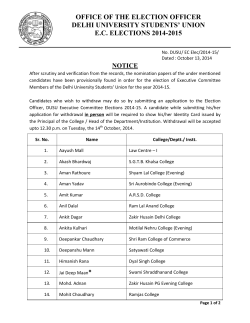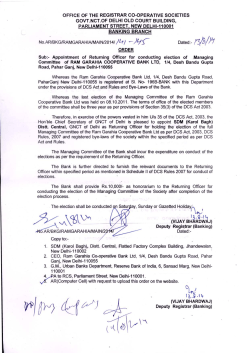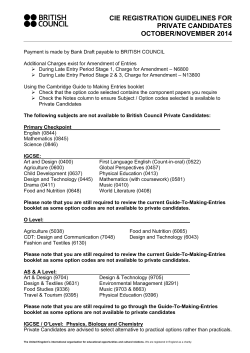
Citizens head to the polls ... for general elections in Bosnia and Herzegovina
BOSNIA-HERZEGOVINA ELECTION WATCH October 10, 2014 KEY ELECTION FACTS AND FIGURES What offices are up for election? At the state level, voters will elect: The BiH Presidency through a plurality system (three members total: one Bosniak and one Croat member elected from FBiH; one Serb member elected from RS) The BiH Parliamentary Assembly House of Representatives through a proportional representation (PR) system (42 members from both entities; two-thirds elected from FBiH and a third from RS) Voters in the Federation of BiH entity will elect: The FBiH House of Representatives (98 members through PR Voters in the Republika Srpska entity will elect: The RS National Assembly (83 members) through PR The President of the RS, and two vice president positions, through a plurality system Voters within each of the Federation’s 10 cantons will elect: Cantonal assemblies through PR Voters Registered – 3,236,003 Polling Stations – 5,520 Candidates Registered – 3,524 candidates on 517 lists for state and entity races Observers Accredited – more than 8,000 Citizens head to the polls on October 12, 2014 for general elections in Bosnia and Herzegovina (BiH), voting for the state-level parliament and presidency; the Federation of BiH (FBiH or Federation) and Republika Srpska (RS) entity parliaments; the RS presidency; and cantonal assemblies in the Federation. The country has faced many challenges along its path of democratic transition since the Dayton Agreement ended inter-ethnic war almost two decades ago, as ethnic and territorial divisions continue to undermine the development of a durable, democratic political system based on accountability. Mistrust between the country’s three main ethnic groups occupies BiH’s political space – often at the expense of issues important to citizens – and frequently thwarts progress on important reforms, including constitutional changes required by the SejdicFinci ruling of the European Court of Human Rights – a binding international obligation that is also necessary to achieve benchmarks for European Union (EU) candidacy status.1 Despite pressure from the international community, the escalation of citizen protests, and clear ties between reform and BiH’s European future, state-level politics and issues of ethnicity continue to obstruct even modest efforts at reform. Concerns regarding manipulation of these elections contribute to what is an already challenging political atmosphere. BiH is faced with increasing economic hardship – exacerbated by devastating floods in May 2014 1 This 2009 ruling found that the rights of non-constituent peoples of BiH, i.e. not Bosniak, Croat, or Serb, were violated by the BiH Constitution since only members of the three constituent peoples can be elected to the BiH state presidency. While the EU led negotiations among BiH’s leading parties to consider potential changes, no compromise was reached and the Constitution has yet to be amended. and a resulting humanitarian crisis, including the displacement of thousands of citizens and the destruction of key infrastructure and property – as well as growing frustration from citizens with rampant corruption, high unemployment, bloated and inefficient bureaucracy, and state capture by political interests that detract from the public good, as pointedly evidenced by widespread protests in February 2014. Sunday’s general elections represent the first real opportunity for citizens to express themselves in complete measure. The Campaigns As expected, major political parties offered candidate lists for all parliamentary levels, members of the BiH presidency, and RS president. In the Federation, the Croatian Democratic Union (HDZ BiH), in coalition with a number of parties organized around the Croatian National Assembly; Party of Democratic Action (SDA); and Social Democratic Party (SDP) battle it out for votes, along with Zeljko Komsic’s Democratic Front (DF) and Fahrudin Radoncic’s Union for a Better Future of BiH (SBB), both relatively new. In the RS, the major contest is between the ruling Alliance of Independent Social Democrats (SNSD) and opposition parties, including the Serbian Democratic Party (SDS) and Party for Democratic Progress (PDP), gathered under the umbrella of the Alliance for Changes. The addition of the coalition “Domovina” (Homeland), which comprises seven non-Serbian parties including SDA and DF, may be a factor in the outcome in attracting Bosniak voters in the RS who otherwise might not vote or see their votes dispersed. Though the official campaign period began on September 12, parties have been in active campaign mode for months, if not longer. Community meetings and public forums led by parties and local officials, long before the campaigns began, were more visible than in past cycles. And for the first time since the war, these general election campaigns were largely oriented around issues of concern to citizens – primarily the economy, unemployment, and corruption, which continue to top the list in the Institute’s public opinion research – rather than issues of ethnonationalism. Many parties, however, still struggled to present or communicate specific programs or plans for consideration, and consequently, parties’ messages revealed only minor differences at surface level. Even campaign slogans took on remarkably similar themes – most tied to unity and accountability to the people. And while negative attacks on political opponents, coming from parties throughout the political spectrum, were also main features of the campaigns, accusations generally concerned corruption and accountability issues, rather than nationalist vitriol, presenting a major shift from past campaign cycles. In the last few weeks, get-out-the-vote (GOTV) efforts have been increasingly important to parties, as citizens’ intentions to vote remain relatively low – barely half of the respondents in NDI’s polling indicate that they would “certainly” vote. Low voter turnout is particularly anticipated among youth, where likelihood of voting falls below 50 percent. Those least likely to vote cite a lack of suitable options and the failures of political parties as their reasons, leaving parties with the challenge to demonstrate that they will work in the public’s best interest. Races to Watch Races for the BiH state presidency, as well as for RS presidency continue to be close. An unprecedented 10 candidates are competing in the race for the Bosniak member of the BiH presidency, including Radoncic (SBB), Emir Suljagic (DF), Bakir Izetbegovic (SDA), and Bakir Hadziomerovic (SDP), who, according to local media, lead in polls, with slim margins between them. A slight advantage is usually given to Izetbegovic as the incumbent who has also drawn flack for not responding to any invitations to participate in candidate debates. However, in focusing their criticism on Izetbegovic, the other candidates have seemingly struggled to differentiate their respective plans and positions. The presidency election is ‘first-past-the-post;’ there is no run-off. The outcome for the race for the Croat member is also uncertain, with Dragan Covic (HDZ BiH) and Martin Raguz (HDZ 1990) as top candidates. While HDZ BiH’s campaign has focused largely on the so-called “Croat question,” Covic has used several opportunities to steer messaging to the importance of EU integration and economic development. Raguz has similarly presented a strong European vision for BiH. In the RS, opposition parties in the Alliance for Change have shown readiness to unite against the ruling SNSD, though they have struggled to translate strong public dissatisfaction over government performance into robust support for the coalition by not presenting a unified platform. For the first time in the past decade, SNSD does not have predominant support among of voters, which could put its candidates for the Serb member of the BiH Presidency and RS Presidency, respectively, at risk. Media reports close races between Zeljka Cvijanovic (SNSD) and Mladen Ivanic (PDP) for the state presidency, as well as SNSD-leader Milorad Dodik and Ognjen Tadic (SDS) for RS President, with projections varying week to week. And while campaign refrains have returned again to defending the RS, opposition parties – particularly SDS, which was recognized by the Sarajevo-based Alumni Center for Interdisciplinary Studies (ACIPS) as offering more concrete measures in its campaign than other parties – have campaigned on economic development. For many, the most significant question concerns what coalitions will form following the elections – and when. BiH took nearly 16 months to form a state government after the last general elections in 2010. Election Administration and Processes BiH has faced a gradual decrease in the quality of its electoral process over the past few election cycles, including through its failure to amend electoral legislation in line with internationally recognized standards. In 2012 local elections, the Central Election Commission (CEC) reported a number of frequent violations, including cases of multiple voting; inconsistencies between signatures of those voting and the number of ballots cast; and gaps between the number of valid and invalid ballots recorded and existing. These concerns, as well as others from past cycles, still linger, while concerns about political manipulation of the process, ranging from undue influence on election administration and improper conduct during the voting and balloting process by party-nominated pollworkers, raise public anxiety over the integrity of the process. In the months leading up to the elections, preparations for their administration, led by the CEC, have proceeded largely on schedule and in accordance with the law. Areas devastated by the May 2014 flooding have presented some logistical challenges, particularly in terms of securing locations for voting as well as in ensuring access to voting for those voters particularly affected. Some concerns have been registered regarding the ‘trading’ of commissioners at polling stations: while parties are legally allowed to nominate one commissioner to each polling station commission (PSC), parties allegedly trade positions to secure representation or dominance in locations of particular political interest. Reports of misuse of public resources by parties and public officials in campaigning were also common. Concerns for voting on election day itself – especially regarding traditionally widespread practices of carousel voting, family voting, and assisted voting – and for the possibilities of fraud during the vote count, are high. Local Election Observation and Other Civil Society Efforts NDI’s public opinion research in August 2014 indicated that 70% of citizens statewide expect the elections to be generally free and fair, though perhaps with some shortcomings, while 22% believe that the elections will not be free and fair. To provide citizens with more information so they can determine their level of trust in the process, the Coalition “Pod Lupom” (Under the Magnifying Glass) has launched an initiative to monitor the elections. Composed of seven nongovernmental organizations (NGOs) from throughout BiH, the Coalition will deploy more than 3,000 trained citizen observers on election day to conduct a sample based-observation, from which it which it will draw statistically relevant findings and recommendations. It “Pod Lupom” raises awareness also deployed 42 long-term observers during the preamong citizens about electoral rights election period, beginning in July, whose findings were and potential violations during street released just ahead of election day. Issues and concerns in campaigns, held in 42 cities around the pre-election period track largely with those noted in Bosnia-Herzegovina. the above section; improvements include an increase in the number of women in election administration positions, transparent verification of political subjects, professional conduct of the election administration, improved training for polling station committees, and greater interest in nonpartisan election observation. The CEC issued accreditations to more than 8,000 citizen observers – more than 10 times the number accredited in 2010. Other NGOs have been active in the pre-election period: Center for Investigative Reporting (CIN) published a database regarding politicians’ assets, including property records of 160 parliamentarians, ministers, and other elected officials – of which nearly a hundred are candidates for election. Zasto Ne? conducted analysis of fulfillment of past election promises of parties at the state and entity levels through its Istinomjer project, finding that three percent were filled. Center for Civic Initiatives (CCI) monitored the state, entity, and cantonal government performance. It found inefficient bodies according to realization of laws. For example, the Council of Ministers’ recent mandate adopted only 106 laws in the past four years – down from 180 in the previous period, and compared to approximately 350 in Montenegro and 500 in Serbia in the same time. Transparency International BiH (TI BiH) monitored campaign expenditures, including paid advertising and campaign rallies, and the use of public resources for campaign promotion. It found that roughly 24 million Bosnian Marks (approximately $15.5 million) were distributed to political parties from public budgets at different levels of government – which they put in context as the average, annual pension for 6,000 retirees. TI BiH emphasized that there is no control over the expenditure of these funds, and little pressure from the public to make this financing more transparent. Media Media Plan Institute, an independent, nonpartisan organization dedicated to freedom of expression and the media, has been systematically monitoring the media coverage of the campaign period. The methodology examines the media’s performance in providing objective and balanced coverage of the contestants and their platforms so that citizens understand the quality of the information they receive and can make informed choices. Major findings of monitoring2 thus far include that, while the media provide voters with a diverse range of information about contestants and political subjects, some outlets remain under strong influence from their owners and political patrons and have shown open biases toward particular political subjects. The three public television broadcasters covered the election campaign from substantially different positions, owing to divergent editorial policies which, particularly for the entity television channels, are largely ethnically and politically opposed. While RTRS was found to provide more favorable coverage of the ruling SNSD and as much as 75% of coverage was allocated to RS ruling powers, BHT1 and FTV offered more balanced approaches, in comparison to 2010 monitoring, even criticizing the state and entity governments for inactivity regarding the floods, among other issues. Both, however, devoted the largest share of coverage to SDA – 13% on BHT1 and 14% on FTV, with the next highest coverage going to SNSD and HDZ at 5% each on BHT1, and HDZ at 5% on FTV. In positive developments, Media Plan found that some media outlets attempted to provide more analytical coverage, and more televised debates took place in these campaigns, many following the format and methodology piloted by NDI in BiH in 2010. However, the decision of some 2 Media Plan’s reports are available online: http://www.mediaplan.ba/en/?ID=142. incumbent politicians not to participate resulted in a lack of genuine debate on substantive issues that could help voters to better analyze and assess their electoral options. Women’s Political Participation In line with international recommendations, the electoral law was revised to increase the gender quota for candidate lists and composition of the election administration to a minimum of 40 percent of women. Candidate lists also require a so-called zipper system, by which at least one woman should be among the first two candidates; two among the first five candidates; and three among the first eight candidates, and so on. While there are no sanctions for noncompliance, the CEC can reject lists that do not fit the requirements.3 No lists were returned to parties by the CEC. However, women candidates have a limited profile in these campaigns – perhaps as few women candidates are in position for high profile races. For example, of 17 candidates registered for the BiH Presidency election, only one is a woman, and only two of 19 candidates for RS President and Vice Presidents are women. Within election administration, more than half of municipal election commissions (MECs) failed to comply with the 40 percent quota, which was considered cumbersome in commissions with only three members. Even so, seven of those MECs failed to include even one woman on their boards. The National Democratic Institute (NDI) is a nonprofit, nonpartisan, nongovernmental organization that responds to the aspirations of people around the world to live in democratic societies that recognize and promote basic human rights. With funding primarily provided by the United States Agency for International Development (USAID) and the National Endowment for Democracy, NDI has worked in Bosnia and Herzegovina since 1996, implementing technical assistance programs to political parties, parliament, and civic organizations. With funding from USAID, the Norwegian Ministry of Foreign Affairs, and the British Foreign and Commonwealth Office, NDI is supporting local actors to contribute to a transparent and fair electoral process as an important component of Bosnia and Herzegovina’s democratic development. The EU Delegation in BiH, NED, and Dutch Embassy, also contribute to these efforts through support to NDI’s local partners. For more information, please contact: Nenad Simovic, NDI/BiH Resident Director nsimovic@ndi.org | Tel: +387 33 237 644 3 If candidate lists do not comply with the quota, the CEC shall certify the list up to the number fulfilling the requirements established by law. For election administration commissions that do not respect the quota, the CEC shall annul the appointment of the members. The body can be reformed within 15 days, and if not done properly, the CEC has the right to appoint members.
© Copyright 2025










